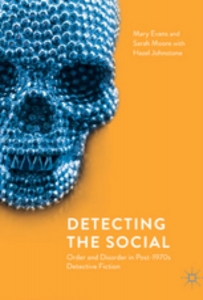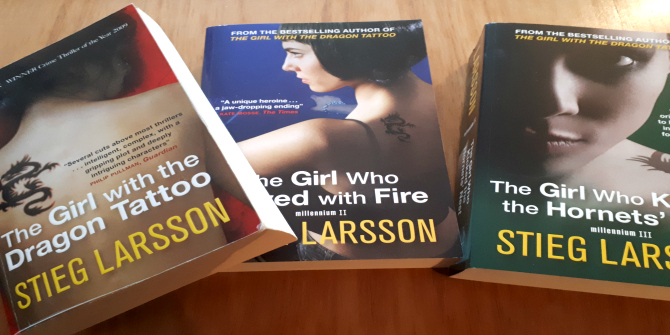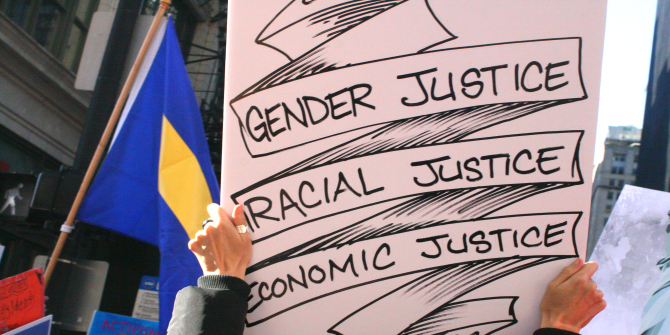In their new book, Detecting the Social: Order and Disorder in Post-1970s Detective Fiction, Mary Evans, Sarah Moore and Hazel Johnstone show how twenty-first-century detective fiction offers insight into our increasingly complex contemporary world and explore what sociology, as a discipline, can learn from it. In this author interview, they discuss detective fiction as a form of sociological enquiry, changing notions of blame and responsibility in the genre and their experience of undertaking this collaborative work.
Q&A with Mary Evans, Sarah Moore and Hazel Johnstone, authors of Detecting the Social: Order and Disorder in Post-1970s Detective Fiction (Palgrave, 2018)
Q: Detecting the Social focuses on European detective fiction produced post-1970, with a particular emphasis on the ‘noir’ of the UK and Scandinavia. What led you to choose these historical and geographical frames for the study?
We chose the UK and Scandinavia for a number of reasons: the range and international reach of the detective fiction published in these countries, the high public profile of much of this literature (for example, Stieg Larsson’s The Millennium Trilogy) and the shared politics of these countries: namely, commitments to welfare and versions of social democratic governments.
Q: Detecting the Social is not intended as an encyclopaedia of recent detective fiction. Instead, you argue that detective fiction is itself ‘a form of sociological enquiry’ that is particularly adept and even ‘prescient’ when it comes to capturing social change. Could you explain how detective fiction functions in this way?
Detective fiction is essentially concerned with the social causes of crime and its impacts on individuals, families and communities. In this respect, its core concerns are very close to criminology and sociology. But it goes further than this and asks the essential question of why certain individuals, and not others, become involved in ‘crime’, either as victims or criminals. To capture social change involves the ability to ‘sense’ the present, to be able to communicate what has been described as the ‘geist’. Academic subjects are often disinclined to do this; they are evidence-based and often wary – for good reason – of accounts of individual experience. Much post-1970s detective fiction, on the other hand, is directly engaged in the task of working out what it means to live in social worlds that are rapidly changing – due to, amongst other things, immigration, globalisation, ghettoisation and financial insecurity.
Q: You identify rather different attitudes to notions of blame and responsibility in detective fiction post-1970, particularly with regards to the role of institutions. Could you summarise some of these changes from earlier incarnations of the genre?
Earlier incarnations of detective fiction have – often with many reservations – expressed respect for institutions such as the law, the police and the political establishment. All these contexts have been the subject of extensive critique in the past 30 years, as have those more personal institutions such as the family and marriage. It’s not that there wasn’t always a degree of scepticism about the ‘conventional’ world, but rather that this has become more public – part of mainstream political debate and discourse, even.
Q: You make the striking point that detective fiction post-1970 is often structured around absence, from missing persons to lost records. It seems the genre is particularly alert to the harms wrought not just by what is done, but also what is concealed, omitted and deliberately kept out of view. How much is detective fiction propelled by a ‘monumental effort of memory-recovery’ and can the genre contribute to wider contestations of narratives of the past?
We very much hope that detective fiction can ‘do’ recovery, both of the past and the present. It’s a hugely important theme and one that continues to be resisted by many public institutions. Here, again, post-1970s detective fiction has much to say. These novels commonly focus on historic crimes of cruelty and corruption, and to a far greater degree than previous forms of detective fiction. And working out ‘what really happened’ – the focus for much post-1970s detective fiction – tends to require the literary detective to dig through dusty official files, relocate conveniently ‘lost’ records. It constitutes a monumental effort to restore institutional memory, and it’s work that is born of a deep resolve to reassemble the personal story that lies beyond the case file. Set against that, we find a tendency for institutions to bury and conceal information in the post-1970s detective novel, and this tends to be framed as symptomatic of deeper social problems – a catastrophic failure to protect, or even care. In that context, it’s certainly possible to see the literary detective’s effort to restore and enliven institutional memory as political (with a small ‘p’).
Q: You highlight that while post-1970 detective fiction emphasises multiple contradictory narratives, this is not shown to be an anathema to the pursuit of truth, but can be essential to deeper understanding. Can this perspective help us in a moment seen to be marked by radical uncertainty, scepticism at expertise and institutional thinking and the rise of so-termed ‘post-truth’ politics?
We think that the answer here has to be yes: we have to acknowledge the complexity of contemporary social life in which people live fractured lives (in terms of place, employment and relationships) and in which essential skills (not least competence in all forms of IT) are located outside conventional workplaces. And so it’s perhaps no surprise that post-1970s detective fiction, prescient as it is, tends to warn of the dangers of depending too heavily on singular perspectives that offer a complete, authoritative view of things.
A striking feature of this body of fiction is the tendency to use multiple narrators, a shifting narrative point of view and even, in some cases, characters with multiple personalities/narrative voices. This tells us much about how post-1970s detective novels expect us to connect with the problems it lays before us. In many cases, it means that there is no empirically verifiable solution ‘out there’, waiting to be discovered by an enquiring mind, but rather complex explanations that can only be partially brought out into the open. As any reader of, amongst others, Stieg Larsson, Asa Larsson, Karin Fossum, Tana French or Mick Herron will know, post-1970s detective fiction is keener on disentangling situations and events than offering exposition. At the same time – and this is very important – this body of literature resists collapsing into relativism and scepticism. It’s not that there is no ‘reality’ or ‘truth’ in post-1970s detective novels – after all, these novels have a deeply visceral quality, something we explore at some length in the book. What these novels suggest is that the truth is often better served by deserting any presentiments we might have about who knows best, or at least interrogating the bases of their authority.
Q: Reaching beyond detective fiction, you argue against the separation of ‘theory’ and ‘the imagined’ within sociology and call for ‘a radically different conception of the sociological value of literature’. How might literary texts enable us to better understand what you refer to as ‘social texture’ – the intricate, lived relationships between individuals and social structures?
Literary texts first and foremost teach us that individuals lead prismatic lives, and that’s something that traditional social theory has historically struggled to capture. We think texture is a useful term for getting at some of this. It’s a concept used in the Arts to refer to the combination of elements to create perceptual depth. The task of the art critic in discerning the texture of a work is to discern the elements of the artwork, their relationship and effect: to move, that is, between the part and the whole, and do service to each. The literary detective works in a similar way, and in doing so shows up the importance of texture as a critical tool for making sense of the social world. Indeed, if the literary detective were to approach the social world as a structure or a system – the more usual and prized metaphors of social theory – they would forgo an understanding of why some people are driven to do bad things. They know that power and status produce hierarchies, but it is their understanding of what it means to be lonely, the strain of pretence and the possibility that neglect has a cumulative effect that make them well-placed to understand the different ways in which people can inhabit the same social world. In these respects, and others besides, we think that sociology could learn much from contemporary detective fiction.
Q: In the ‘Afterword’, you describe the shared inspiration for the study and your experience reading and choosing the texts. What role did collaboration and reading pleasure play in this particular project?
Collaboration on this book was a huge delight. Academic writing can be a very lonely activity, and that was quite simply not the case here. This is why we decided to write an Afterword – we wanted to sketch out the context (professional, political, social) out of which the book emerged, and we wanted to write about the value of collaboration, a practice that is often undervalued in contemporary universities. Our profession is increasingly geared towards rewarding individual success – whether that’s through probationary targets, annual staff reviews, rates of grant ‘capture’, unit evaluation scores and so on. What gets lost in all of this – what is steadily eroded in all of this – is collaboration, because with this form of intellectual practice individual contributions can’t be easily isolated and measured. And this means that the diffuse benefits of thinking, talking, reading and writing together are customarily neglected.
Q: Towards the end of the book, you describe detective fiction today as channelling emotions of pain, fear, rage and a desire for vengeance, and state that the most compelling lesson of the genre might be that ‘deep, unanswered anger goes somewhere’. Is detective fiction a despairing, pessimistic genre – or is its emotional repertoire more complicated?
Detective fiction is certainly not despairing, because it seeks to understand. That very commitment to engaging with the ‘whys’ of human existence makes it optimistic. Of course, it deals with what is sometimes called the ‘dark’ side of human life, but at the same time it shows the simplicity of that view and the reality of social complexity. That in itself is optimistic since it shows a way of engaging with the world without assuming the certainty of those binaries of ‘good’ and ‘bad’.
Note: This interview was conducted by Dr Rosemary Deller, Managing Editor of the LSE Review of Books blog. This interview gives the views of the interviewees, and not the position of the LSE Review of Books blog, or of the London School of Economics.
Image Credit: The Millennium Trilogy novels, Stieg Larsson (Rosemary Deller).


 Find this book:
Find this book: 





